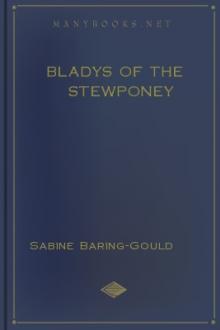The Broom-Squire - Sabine Baring-Gould (life books to read .txt) 📗

- Author: Sabine Baring-Gould
Book online «The Broom-Squire - Sabine Baring-Gould (life books to read .txt) 📗». Author Sabine Baring-Gould
His heart was bitter as wormwood.
Mrs. Verstage saw but too plainly that her son was estranged from her; and she could form a rough estimate of the reason. He addressed her indeed with a semblance of love and showed her filial attention, but her maternal instinct assured her that something stood between them, something which took the reality and spontaneity out of his demonstrations of affection.
Iver occupied himself with the picture of Mehetabel at the fountain. It was his great pleasure to work thereon. If he was not engaged at his canvas in the tavern, he was wandering in the direction of the Punch-Bowl to make studies for pictures, so he said. His mother saw that there was no prospect of retaining her son at the Ship for long. What held him there was not love for her, desire to recover lost ground with his father, not a clinging to his old home, not a desire to settle and take up his father's work; it was something else--she feared to give utterance to the thought haunting her mind.
"You are a fool, old woman," said her husband to her one night. "You and I might have been easy and happy in our old age had you not meddled and made mischief. You always was a great person for lecturin' about Providence, and it's just about the one thing you won't let alone."
"What do you mean, Simon?" she asked, and her heart beat fast with presage of what he would say.
"Why, Susan, if you had not thrust Mehetabel into the Broom-Squire's arms when she didn't want to be there no more nor among brimbles, then Iver would have taken her and all would have been peace."
"What makes you say that?" she asked, in a flutter of terror.
"Oh, I'll be bound it would have been so. Iver has been asking all manner of questions about Matabel, and why she took Jonas. I sed it was agin my wishes, but that you would have it, so Matabel had to give in."
"Simon, why did you say that? You set the boy against me."
"I don't see that, Sanna. It is you who have put the fat in the fire. If you try to turn a stream to run uphill, you will souse your own field, and won't get the water to go where you drive it. It's my belief that all the while he has been away, Iver has had his mind set upon Matabel. I'm not surprised. You may go through Surrey, and won't find her match. Now he comes home and finds that you have spoiled his chance, with your meddlesomeness--and there'll be the devil to pay, yet. That's my opinion."
The old man turned on his side and was asleep, but self-reproach for what was past and doubt as to the future kept his wife awake all night.
CHAPTER XIX.
BACK AGAIN.
Fever boiled in the heart of Mehetabel. A mill-race of ideas rushed through her brain.
She found no rest in her household work, for it was not possible for her to keep her mind upon it. Nor was there sufficient employment to be found in the house to engage all her time.
Do what she would, make for herself occupation, there was still space in which to muse and to torment herself with her thoughts. Whilst her hands were engaged she craved for leisure in which to think; when unemployed, the ferment within rendered idleness intolerable.
When the work of the house was accomplished, she went to the fountain where she had been drawn by Iver, and there saw again the glowing brown of his eyes fixed on her, and reheard the tones of his voice addressing her. Then she would start as though stung by a wasp and go along the track up the Punch-Bowl, recalling every detail of her walk with Iver, and feeling again his kiss upon her lips. She tried to forget him; with a resolution of which she was capable she shut against his entry every door of her heart. But she found it was impossible to exclude the thoughts of him. Had she not looked up to him from early childhood, and idolized him? She had been accustomed to think of him, to talk of him daily to his mother, after he had left the Ship. That mother who had forcibly separated her from him had herself ingrafted Iver into her inmost thoughts, made of him an integral portion of her mind. She had been taught by Mrs. Verstage to bring him into all her dreams of the future, as a factor without which that future would be void and valueless, She had, indeed, never dreamed of him as a lover, a husband; nevertheless to Mehetabel the future had always been associated in a vague, yet very real, manner with Iver. His return was to inaugurate the epoch of a new and joyous existence. It was not practicable for her to pluck out of her heart this idea, which had thrust its fibres through every layer and into every corner of her mind. Those fibres were now thrilling with vitality, asserting a vigorous life.
She asked herself the same question that had presented itself to his mind, what if Iver had returned one day, one hour, before he actually did? Then her marriage with Jonas would have been made impossible. The look into his eyes, the pressure of his hand would have bound her to him for evermore.
"Why, why, and oh why!" with a cry of pain, "had he not returned in time to save her?"
"Why, why, and oh why!" with blood from her heart, "did he return at all when too late to save her?"
Mehetabel had a clear and sound understanding. She was not one to play tricks with her conscience, and to reason herself into allowing what she was well aware was wrong. She nourished herself in no delusion that her marriage with Jonas was formal and devoid of the sanction of a spiritual bond.
She took her Prayer Book, opened the marriage service, and re-read the vows she had made.
She had been asked, "Wilt thou have this man, Jonas, to thy wedded husband, to live together after God's ordinance . . . and forsaking all other keep thee only unto him, so long as ye both shall live?" and thereto, in the sight of God and of the congregation, she had promised. There was no escape from this.
She had said--"I, Mehetabel, take thee, Jonas, to be my wedded husband, to have and to hold, from this day forward, for better, for worse, for richer, for poorer, in sickness and in health, to love, cherish and obey, till death us do part, according to God's holy ordinance, and thereto I give thee my troth."
There was no proviso inserted, as a means of escape; nothing like: I will be true to thee unless Iver return; unless, thou, Bideabout, prove unworthy of my love and obedience; unless there be incompatibility of temper; unless I get tired of thee, and change my mind.
Mehetabel knew what the words meant, knew that she had been sincere in intent when she said them. She knew that she was bound, without proviso of any kind.
She knew that she could not love Iver and be guiltless. But she was aware also, now, when too late, that she had undertaken towards Jonas what was, in a measure, impossible.
Loyal to Jonas as far as outward conduct could make her, that she was confident she would remain, but her heart had slipped beyond her control, and her thoughts were winged and refused to be caged.
"I say, Matabel!"
The young wife started, and her bosom contracted. Her husband spoke. He had come on her at a moment when, lost in day-dreams, she least expected, desired, his presence.
"What do you want with me, Jonas?" she asked as she recovered her composure.
"I want you to go to the Ship. The old woman there has fallen out with the maid, and there are three gentlemen come for the shooting, and want to be attended to. The old woman asked if you would help a bit. I said 'Dun know:' but after a bit we agreed for a shilling a day."
"Never!" gasped Mehetabel.
"I tried to screw more out of her necessity, but could not. Besides, if you do well, you'll get half a crown from each of the gents, and that'll be seven and six; and say three days at the Inn, half-a-guinea all in all. I can spare you for that."
"Jonas, I do not wish to go."
"But I choose that you shall."
"I pray you allow me to remain here."
"There's Mr. Iver leaves to-day for his shop at Guildford, and I reckon the old woman is put about over that, too."
After some hesitation Mehetabel yielded. The thought that Iver would not be at the Ship alone induced her to consent.
She was hurt and angry that her husband had stipulated for payment for her services. After the kindness, the generosity with which she had been treated, this seemed ungracious in the extreme. She said as much.
"I don't see it," answered Jonas. "When you wos a baby she made the parish pay her for taking you. Now she wants you, it is her turn to pay."
Bideabout did not allow his wife much time in which to make her preparations. He had business in Godalming with a lawyer, and was going to drive old Clutch thither. He would take Mehetabel with him as far as Thursley.
On reaching the tavern Mrs. Verstage met her with effusion, and Iver, hearing his mother's exclamation, ran out.
Mehetabel was surprised and confused at seeing him. He caught her by the hand, helped her to descend from the cart, and retained his hold of her fingers for a minute after it was necessary.
He had told his mother that he must return to Guildford that day; and when she had asked for Mehetabel's help she had calculated on the absence of her son, who had been packing up his canvas and paints. To him she had not breathed a word of the likelihood that Mehetabel would be coming to her aid.
"I daresay Bideabout will give you a lift, Iver," she said.
"I don't know that I can," said Jonas. "I've promised to pick up Lintott, and there ain't room in the trap for more than two."
Then the Broom-Squire drove away.
"See, Matabel," said Iver, pointing to the signboard, "I've redaubed the Old Ship, quite to my father's satisfaction. By Jove, I told mother I should return to Guildford to-day--but now, hang me, if I do not defer my departure for a day or two."
Mrs. Verstage looked reproachfully at her son.
"Mother," said he in self-exculpation. "I shall take in ideas, a model costs me from a shilling to half-acrown an hour, and here is Matabel, a princess of models, will sit for nothing."
"I shall be otherwise employed," said the girl, in confusion.
"Indeed, I shan't spare her for any of that nonsense," said Mrs. Verstage.
The hostess was much perplexed. She had reckoned on her son's departure before Mehetabel arrived. She would not have asked for her assistance if she had not been convinced that he would take himself off.
She expostulated. Iver must not neglect his business, slight his engagements. He had resolved to go, and had no right to shilly-shally, and change his mind. She required his





Comments (0)